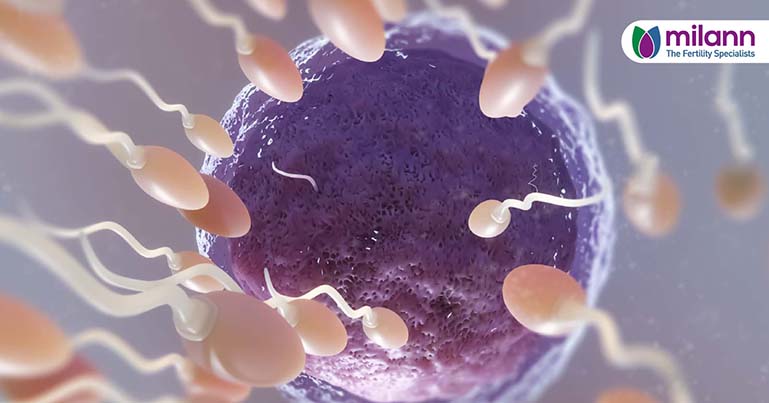Cryopreservation and Sperm Freezing, explained like you’re 5.
Alright, imagine tiny superheroes called sperm that live in a special liquid inside a man's body. Sometimes, a man may want to save these superheroes for later, like putting them in a freezer, so they can be used to make a baby when the time is right.
Sperm cryopreservation is like giving the sperm a superpower cape to help them stay alive and strong even when it's freezing cold. It's a process where the sperm is carefully frozen and stored in a super cool place until they are needed.
So, let's say a man wants to be a dad but isn't ready just yet. He can visit a special place where they freeze his sperm, keeping it safe and sound. When he's ready to have a baby, the frozen sperm can be warmed up and used to join forces with an egg, creating a new superhero, or in our world, a baby!
It's like saving your superhero team for the future when they're needed to save the day and make families happy.
Let’s dive deeper into the world of Cryopreservation and Sperm Freezing.
Cryopreservation, often known as sperm freezing, is a cutting-edge method designed to safeguard the potency of sperm for future use, keeping them vibrant and ready for action when the time is right.
Why Cryopreservation is Necessary
To Overcome Time's Challenge
Life is unpredictable, and so is the timing of family planning. Cryopreservation addresses the ticking biological clock, offering a solution for those not ready to embrace parenthood now but wish to in the future. It ensures that sperm remains as potent as the day it was frozen, overcoming the effects of aging.
To Shield Against Medical Hurdles
For individuals facing medical treatments like cancer that may impact fertility, cryopreservation becomes a shield. It allows them to preserve their reproductive potential before undergoing treatments that could affect sperm quality.
Flexibility in Family Planning
Cryopreservation provides the flexibility to decide when to start a family, free from external pressures. Sperm can be frozen indefinitely, offering a timeless opportunity to plan for the perfect moment.
When should you start looking into Cryopreservation and Sperm Conversation?
Cryopreservation and sperm freezing should be considered as early as possible, ideally in a person's reproductive prime. The optimal age range for sperm freezing is generally under 40 years old, especially for healthy individuals without family histories of cancer or hereditary diseases, even earlier, if their family tree has instances of hereditary illness or chronic disease. However, it's crucial to note that puberty is a significant milestone for sperm maturity, and the process becomes more straightforward in boys over the age of 18.
Considering cryopreservation early provides the opportunity to preserve the highest quality sperm, ensuring better chances of successful fertility preservation. It becomes especially relevant for individuals facing potential threats to fertility. Cryopreservation is a proactive approach to safeguard reproductive potential, allowing individuals to address life's uncertainties and plan for future family building.
Other special circumstances under which to consider Cryopreservation and Sperm Freezing.
Cryopreservation of sperm freezing isn’t just for people who wish to plan for a family in the future. There are many other cases in which one should consider it. Here are a few:
Preservation of Fertility:
Individuals facing cancer treatment such as chemotherapy or radiation that may impact fertility can preserve their sperm for future family planning.
Fertility Assistance:
Couples undergoing assisted reproductive techniques, such as in vitro fertilization (IVF), can use cryopreserved sperm to increase their chances of successful conception.
Donor Sperm Banks:
Sperm banks collect and freeze sperm from donors, offering a resource for individuals and couples experiencing fertility challenges.
Sperm cryopreservation offers a versatile solution for various fertility-related scenarios, providing individuals and couples with options to navigate their reproductive journey effectively.
Breaking some common misconceptions about Cryopreservation and sperm freezing.
It’s time to separate fact from fiction when it comes to cryopreservation and sperm freezing. Here are some of the most common ones:
Fiction: Frozen Sperm is Less Effective
Fact: Modern cryopreservation techniques are advanced, ensuring the health and viability of frozen sperm. It doesn't have a definitive end date, and when requested, the sperm can be thawed for various reproductive procedures.
Fiction: Cryopreservation Affects Future Fertility
Fact: Cryopreservation of sperm, whether through traditional freezing or vitrification, doesn't compromise future fertility. It's a safe and effective method, commonly used in assisted reproductive technologies.
Fiction: Sperm Cryopreservation Is Not Cost-Effective
Fact: While there are costs associated with sperm cryopreservation, it's a valuable investment for individuals facing potential fertility challenges. The long-term benefits often outweigh the initial expenses.
